Activity Level: Above Average
Hypoallergenic: No
Social Ability: Selectively Social
Skills: Hunting, Herding, Guarding
Intelligence: Above Average
Ideal Climate: Temperate
Cane Corso is an Italian canine breed with a long history of skillful labor in hunting, herding, and guarding. Today, these loyal dogs retain their vigilant and trainable nature as they fulfill service and companion roles all over the world.
Breed Overview
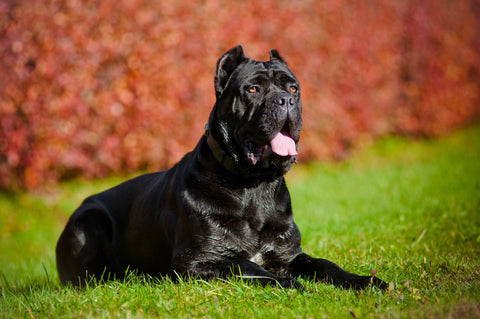 Origin: According to records from the Fédération Cynologique Internationale (International Canine Federation), the Cane Corso dog was first discovered in the early 1900s in Italy. However, with the hindsight offered by genetic testing, it is believed they are descendants of Mastiffs from the Ancient Roman era. Without reliable sources, however, the Corso’s official story begins just over a hundred years ago in southern Italy.
Origin: According to records from the Fédération Cynologique Internationale (International Canine Federation), the Cane Corso dog was first discovered in the early 1900s in Italy. However, with the hindsight offered by genetic testing, it is believed they are descendants of Mastiffs from the Ancient Roman era. Without reliable sources, however, the Corso’s official story begins just over a hundred years ago in southern Italy.
History: Possibly bred with stock from all over the country, Corsos mainly hailed from the southern town of Puglia. Working on homesteads and pulling their weight on farms, they were no less than a staple among working animals. Reliable sources about Corsos during this time are unfortunately scant, likely due to their dwindling population, but records pick back up a couple decades later. Selective breeding tactics helped bring their numbers back up in the 80’s, where Corsos would finally hit their stride and become a valued canine breed.
The Italian Kennel Club would be the first organization to recognize Cane Corso dogs as an established breed when they were added to the roster in 1994. Two years later, the FCI recognized them, and they became a part of the American Kennel Club in 2010. In between their admission into these organizations, their popularity among families and pet owners rose across Europe and into North America. Their loyal nature and friendly faces helped bolster their standing among smaller dogs, and they would become coveted companions in the modern world.
Today, they can be found in loving homes and working on farms, but many are still in shelters. If you are thinking about adding a Cane Corso to your family, we recommend finding an animal rescue near you or checking out any of these find organizations: Cane Corso Rescue, Inc., Must Love Corsos Rescue, West Coast Cane Corso Rescue
Breed Attributes
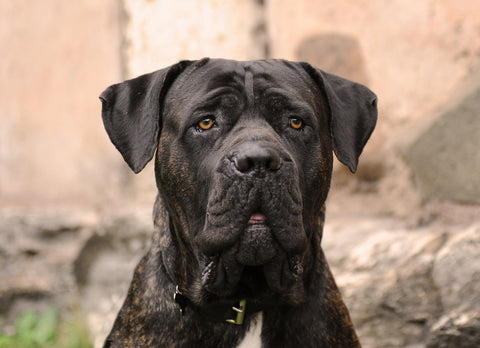 Temperament: Cane Corsos are vigilant and alert, often on-guard and protecting their family. They can be selectively social, often weary of strangers and new animal friends. Once they feel comfortable, you can count on your Corso to enjoy time with friends of any species.
Temperament: Cane Corsos are vigilant and alert, often on-guard and protecting their family. They can be selectively social, often weary of strangers and new animal friends. Once they feel comfortable, you can count on your Corso to enjoy time with friends of any species.
Any dog as loyal as a Corso is susceptible to separation anxiety when left alone or without their owner. It is in their nature to follow their human for guidance, and they can feel lost without them. To help combat this, crate training, calming supplements, and other lifestyle changes are recommended by veterinary behaviorists
Personality: While every dog has their own personality, Cane Corsos are often calm and acutely aware of their surroundings. These smart canines may be suspicious of newcomers, but they won’t be for long; this breed is known have plenty of energy and love playing with any friend, human or not.
As mentioned above, Corsos may be anxious or easily overwhelmed, especially if away from their owner. Training is one of the best methods for addressing anxiety (which we will explain below.) At the same time, their willful nature may lead to unwanted habits and actions of dominance, which can be addressed with behavioral training. We recommend finding a training facility near you to learn more.
Ideal Owner: You! Cane Corsos are incredibly loyal and delightfully playful. With a Corso in your family, you may find yourself enjoying the outdoors more with a sweet, steadfast dog at your side.
Fur Care
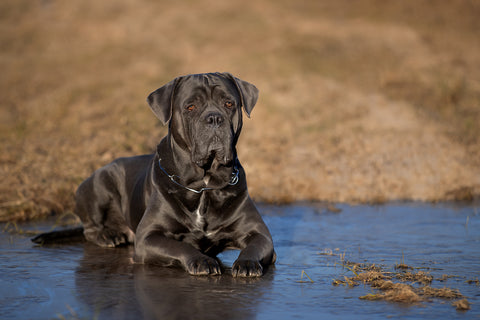 Grooming: A Cane Corso’s coat may look short, but the undercoat is quite thick. A bristled brush is recommended for regular grooming, as it helps remove loose fur and stimulate blood flow to the skin. The climate in which a Corso lives can affect their coat length and density, with thicker fur in colder weather and vice versa. Climates with more extreme seasons may also cause dogs to shed excessively in warmer months (which we will discuss below in Shedding.) Regular grooming at home, including baths with gentle shampoo and brushing, is essential for all breeds.
Grooming: A Cane Corso’s coat may look short, but the undercoat is quite thick. A bristled brush is recommended for regular grooming, as it helps remove loose fur and stimulate blood flow to the skin. The climate in which a Corso lives can affect their coat length and density, with thicker fur in colder weather and vice versa. Climates with more extreme seasons may also cause dogs to shed excessively in warmer months (which we will discuss below in Shedding.) Regular grooming at home, including baths with gentle shampoo and brushing, is essential for all breeds.
Corsos are often outdoor dogs, meaning they can pick up allergens and irritants in their fur more often than indoor pets. After rolling around in the grass or jumping in mud puddles, our Smelly Dog Baking Soda Shampoo deeply cleanses the coat and skin.
Shedding: Corsos are not hypoallergenic, as they shed a fair amount. Their short fur likely won’t clog your vacuum, but that doesn’t mean grooming can be ignored. Consistent skin care is key for canines of all stripes. Veterinarians recommend a healthy diet with plenty of omega 3 fatty acids, regular baths with a gentle shampoo, or ideally both to support normal shedding year-round.
Colors: Dark gray with white chest markings
More to Know: Cane Corso” loosely translates from its original Italian to ‘guardian dog’ in English. This moniker could not be more fitting for this vigilant and loyal canine breed.
Health
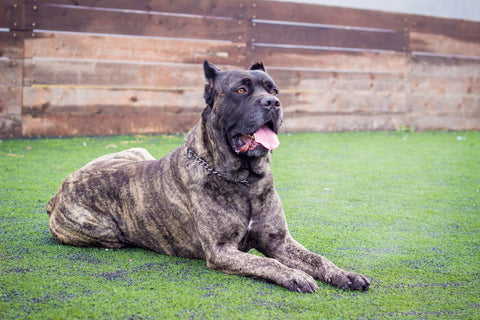 Common Issues: Cane Corso dogs are generally healthy dogs, and responsible breeders check their stock for congenital conditions. There are a handful of health problems to which Corsos are predisposed, and we recommend asking your veterinarian for more information.
Common Issues: Cane Corso dogs are generally healthy dogs, and responsible breeders check their stock for congenital conditions. There are a handful of health problems to which Corsos are predisposed, and we recommend asking your veterinarian for more information.
As extra-large canines, Corsos are predisposed to hip dysplasia and similar conditions that affect the joints. Regular exercise and joint support supplements are key for joint health at all ages, but owners should keep an eye on their mobility and consult a veterinarian if concerned.
Many canines are prone to a serious digestive condition called Gastric Dilation Volvulus or Bloat, in which air gets trapped in the stomach causing the organ to twist on itself. Just as uncomfortable as it sounds, signs of Bloat should not be ignored. Look out for dry heaving and swelling in the abdomen, and talk to your veterinarian for more information.
Your veterinarian may also check your Corso for eye abnormalities and skin problems such as mange, which many dog breeds are prone to. Every dog, regardless of their predispositions, should visit the vet regularly for a check-up and any necessary tests. Monitoring your Corso’s height and weight are also important for their wellbeing and for dosing their supplements.
Nutrition: Every canine needs a balanced diet with plenty of fiber and protein. Their food should be meat-based and contain added vitamins, but most dogs need even more. Veterinarians recommend a daily multivitamin for dogs of all ages to fulfill their dietary requirements and support their overall wellness.
Lifespan: 9-12 years
Physical Activity
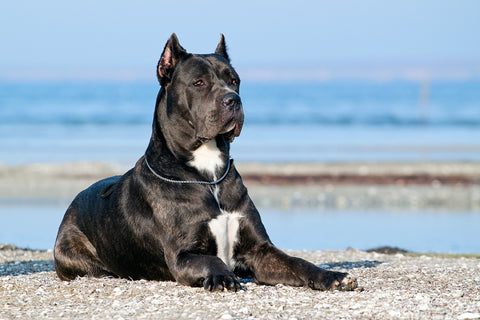 Training: Thanks to their instinctual loyalty, Corsos are highly trainable. With professional guidance, they can be taught to follow verbal commands or hand signals, hunt, and even herd. Obedience and crate training are recommended for all dogs to help achieve and maintain a calm demeanor. By learning to follow your lead, dogs learn to be comfortable and confident which can also contribute to anxiety management. As mentioned above, training your dog early and properly is essential for achieving a calm, confident demeanor. Corsos are known to be eager and relaxed, making training easier as they tend to listen closer and learn faster than others. Most dogs respond well to rewards and positive reinforcement, so a local obedience class may suffice.
Training: Thanks to their instinctual loyalty, Corsos are highly trainable. With professional guidance, they can be taught to follow verbal commands or hand signals, hunt, and even herd. Obedience and crate training are recommended for all dogs to help achieve and maintain a calm demeanor. By learning to follow your lead, dogs learn to be comfortable and confident which can also contribute to anxiety management. As mentioned above, training your dog early and properly is essential for achieving a calm, confident demeanor. Corsos are known to be eager and relaxed, making training easier as they tend to listen closer and learn faster than others. Most dogs respond well to rewards and positive reinforcement, so a local obedience class may suffice.
Exercise: Due to their large size, Cane Corso dogs need plenty of space to run and play. A fenced backyard or a dog park will likely be your Corso’s favorite place. They generally need one to two walks and play sessions each day to keep them occupied and content. Without an outlet for their energy, dogs can become restless and act out. It is recommended to also use interactive toys to keep your pup focused and active while they’re home alone.
Many veterinarians also recommend joint support supplements for adult dogs to help rebuild and maintain healthy cartilage. This is especially crucial for larger, heavier dogs, as their joints undergo more stress when they run and jump, and they may need additional nutritional support to keep their joints healthy.

Cane Corso dogs have been helpful and loyal companions for decades, and they remain so to this day. Whether they’re helping out on a homestead or keeping their family company at home, you can count on a Corso to be dependable and adorable.

